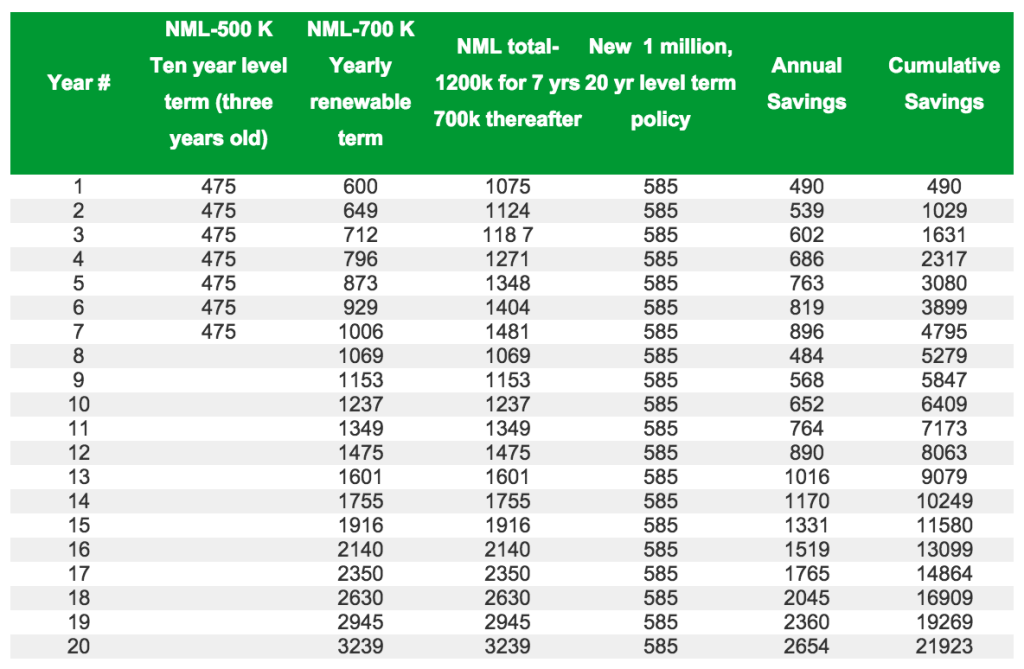Should I Drop My Whole Life Policy? Case Study #11
This is a common question from clients unsure about what they have and a common recommendation from agents seeking to earn a new commission. Yesterday I talked to a Virginia client considering dropping a Lafayette whole life policy which he had purchased eight years ago when an agent recommended he replace a 20 year old Northwestern policy. Earlier this month a local client’s Edward Jones advisor recommended he replace a 30 year old Northwestern whole life policy with a new John Hancock policy. All of these were bad ideas.
At least three things drive these costly mistakes:
- it’s difficult for the consumer to understand the value of a cash value policy, since it’s a mixture of insurance and investment.
- the entire industry moves on agents pursuing commissions which only happens when new policies are sold.
- some respected financial advisors, e.g. Dave Ramsey, make generalizations disparaging whole life insurance.
I am not a fan of whole life insurance and rarely recommend a new purchase. (Though some companies and specific policies are much better than others and there’s a small niche for these.) However there’s a dramatic difference in purchasing a new policy and continuing an old policy that’s beyond the high early year transaction costs. Just because I don’t recommend new purchases doesn’t mean that I endorse casually dropping old policies. This decision is influenced by your age, health, investing alternatives, and largely the caliber of your policy.
Yesterday’s client should keep the Lafayette policy. An in force ledger revealed cash value earning 4%, and he already had a lot of cash earning next to zero. His immediate priority is putting his low earning cash to better use. He should have never bought the Lafayette policy to replace a Northwestern Mutual whole life policy, but that’s water over the dam now, and at least this time he’s getting advice before acting.
My local client averted a mistake by asking for an unbiased opinion first. Replacing a 30-year-old Northwestern policy with a new John Hancock policy would have only profited the agent.
Consumers don’t recognize commissions on a whole life policy are one to two year’s premiums (!), a flagrant violation of John Bogle’s eternal triangle principle of minimizing cost. It’s usually impossible for improved nuances of a new whole life policy to overcome such a blow. Adding insult to injury, switching from Northwestern Mutual to Lafayette or John Hancock were steps down in quality, only underscoring the lack of discernment and/or self-interest of the agent.
There’s another valid perspective on whether to keep a whole life policy. Whereas the Lafayette cash value was earning a net 4%, and that’s very favorable compared to a savings account, it’s unfavorable compared to long-term stock market returns averaging around 10%. And make no mistake, a life policy is a long-term investment if kept until death.
However for both these clients the cash values were a minor portion of their assets much of which were already invested in equities. Also each had a lot of low-earning cash which became the most-likely-to-improve candidate. Had this not been the case, replacement was more of a possibility, but for the sake of putting proceeds in equity returns and certainly not to buy another whole life policy. Client context can swing the decision either way.
If you’re tempted to cash in an old whole life policy:
- Understand what rate of return is being earned on its cash value. (Not the published rate, but the real rate.) It’s usually higher than alternatives of similar risk.
- Agents recommending replacing old cash value policies with new ones are often the fox guarding the hen house. Rarely can improvements overcome new commissions.
- If a financial guru categorically suggests replacing any whole life insurance he is often throwing out the baby with the bathwater.
What’s the take-away from these cases? ASK before you ACT. The Virginia client’s mistake eight years ago was an uninformed response to an uninformed agent. This time he’s ASKING. The local client averted a similar mistake by ASKING upfront. It grieves me to see such waste so easily avoidable. Calculating the true rate of return on your current policy is child’s play for me and my charge is small potatoes compared to what’s at stake. Proverbs 20:18.
Corollary: ASK an IMPARTIAL source. Ironically the supposed authority, the licensed insurance agent, precipitated these mistakes.
Qualification: We’ve been talking about old policies. If a whole life policy is less than three or four years old (before transaction costs have been paid) it may be best to discontinue ASAP, after replacing with cheaper coverage first, dependent on several considerations.

